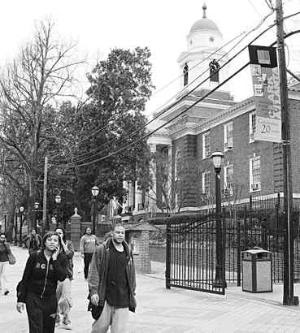
Many students can't afford to go elsewhere and rely on financial aid. Painful choices may loom.
By Errin Haines
Associated Press
ATLANTA - Historically black colleges and universities, which for decades have been educating students who can't afford to go - or can't imagine going - elsewhere, have been particularly challenged by the nation's economic meltdown.
Enrollments at the schools have declined while endowments have dropped and fund-raising sources have dried up. The same is true at most universities, but often students at black colleges need more aid to stay on course.
"What's most difficult for our institutions is that they are tuition-driven," said Michael Lomax, president of the United Negro College Fund. "They don't have large endowments, and even the ones who do have seen a large reduction in the value of those endowments."
Most colleges are dealing with economic problems. One survey on 791 American public and private colleges reported that endowments fell 3 percent in the fiscal year that ended June 30, and a smaller group estimated a 23 percent drop in the first five months of fiscal 2009.
The decline is nearly double that of any full-year return since such figures were first tracked in 1974.
Only three black colleges - Howard University in Washington, Spelman College in Atlanta, and Hampton University in Virginia - had endowments among the top 300 included in the survey. Most lack the resources and strength in alumni giving of their mainstream counterparts.
Most students at the colleges combine grants and loans to fund their educations, Lomax said. A small percentage get help from their parents, and others work retail or fast-food jobs to make tuition.
An Associated Press analysis showed that 62 percent of students at 83 four-year historically black colleges receive Pell Grants. More than 90 percent of those recipients come from families earning less than $40,000 a year.
Lomax expects the colleges to survive, but they may have to make some painful choices to do it. "These are institutions that have made it through the Great Depression and other cyclical downturns," he said. "What we're doing is counseling schools to tighten their belts as much as possible."
That has Adrianna Ebron, a Spelman sophomore from Baltimore, reconsidering the strategy for her studies.
Spelman recently announced it was phasing out its department of education in favor of a shared teacher-certification program based at Clark Atlanta University that will also include Morehouse College. All three are part of the Atlanta University Center, which recently announced cost-cutting measures that will include sacrificing people and programs.
Ebron is majoring in history but was attracted to Spelman's education department, which has long been a part of its legacy. Her minor was secondary education, with a goal to teach history. But she now plans to postpone her teacher certification until graduate school because for her, taking classes at Clark Atlanta isn't an option. "It just messes up my whole plan for my education here," she said.
Other cost-cutting measures at Spelman include eliminating 35 positions and closing campus for the week after graduation in May. Clark Atlanta cut 100 workers and canceled its physical education classes. At Morehouse, 25 adjunct professors, a third of the school's part-time instructors, were released.
Morehouse enrollment is down 8 percent from last year and the school's endowment is down to about $110 million from a high of $150 million. And fund-raising has been tough, especially from corporate and high-profile donors, Morehouse president Robert Franklin said.
A bright spot has emerged at Morehouse, however: An increase in alumni donors, especially first-time givers. "They feel a greater responsibility for the health of the college," said Franklin.
Similarly, Spelman has seen 1,000 more donors, a 67 percent increase in alumnae giving and a 250 percent increase in giving from parents. But in both cases, the gifts have been smaller, and Spelman faces a budget deficit of $4.8 million.


No comments:
Post a Comment